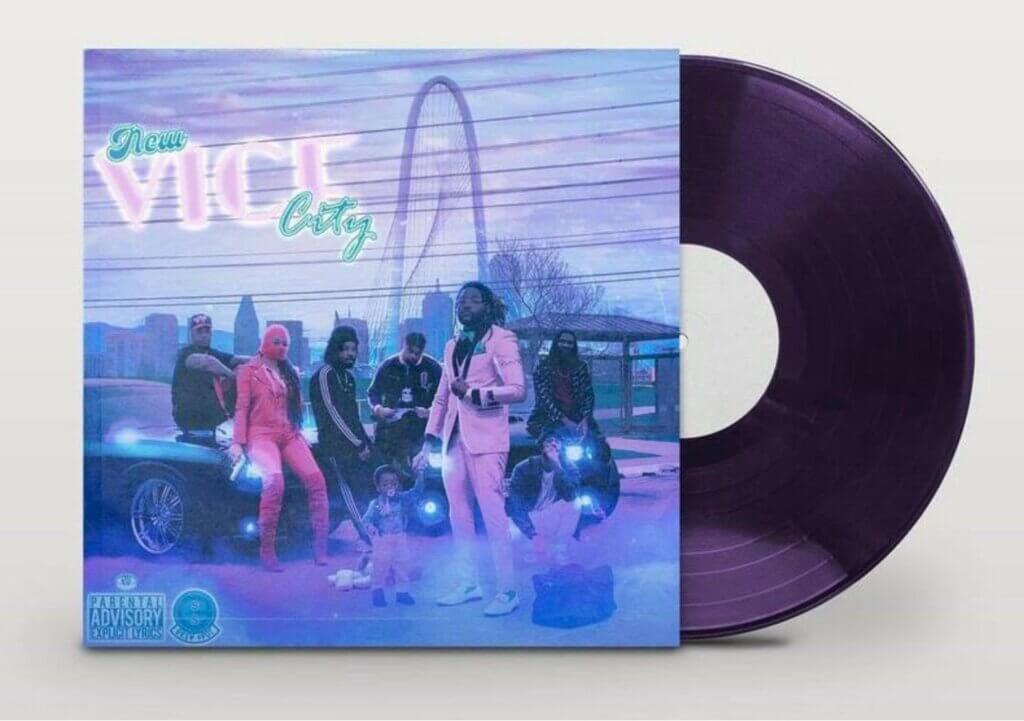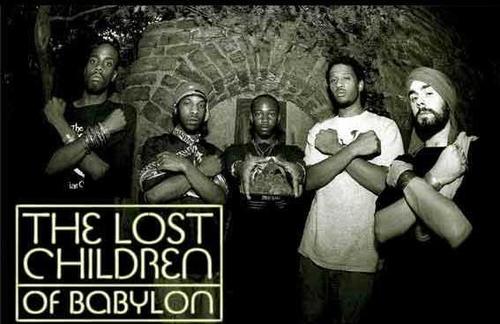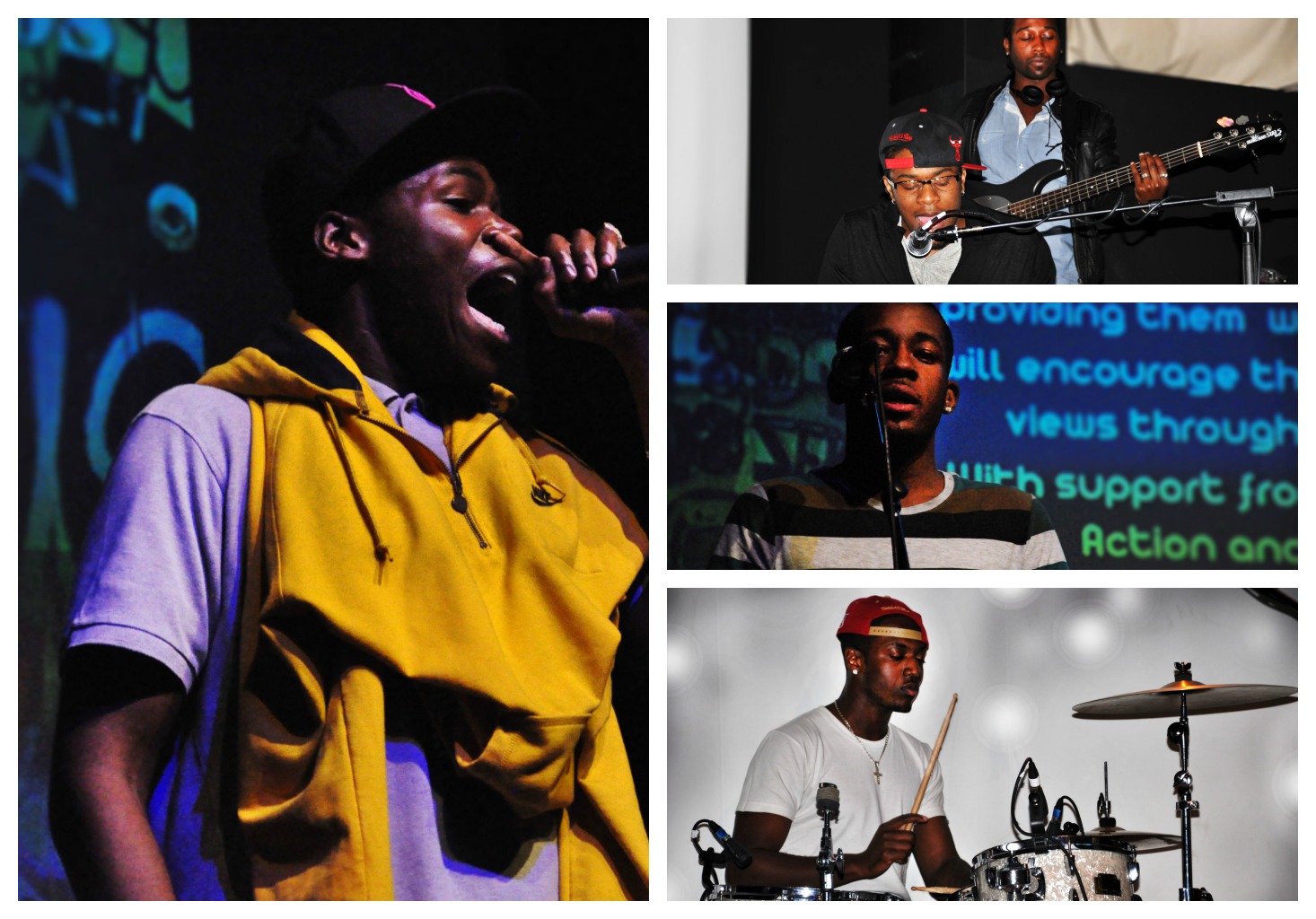
LISTEN TO ‘NEW VICE CITY’ HERE
In the realm of Dallas hip-hop, Pr¥nce Ace stands as a rising force, and his latest project, ‘New Vice City,’ is a testament to his dedication and artistry. The album, a vivid exploration of the Dallas music scene, draws inspiration from the city’s multifaceted landscape and bears the mark of collaboration with a diverse array of local talent. Pr¥nce Ace dives into the three acts that structure the album, each delving into different themes and contributing to an overarching narrative that reflects personal growth, relationships, and a sense of urgency in the final act. Facing setbacks, including canceled collaborations and funding challenges, Pr¥nce Ace navigates these obstacles with resilience, shaping ‘New Vice City’ into a testament of his authenticity and determination. As a founding member of GreySpot Syndicate Records, he emphasizes the importance of artistic collaboration and sibling-like competition within the group. Influenced by legends like Tupac, Eminem, and Nas, Pr¥nce Ace weaves their impact into his unique style, showcasing a commitment to lyricism and positive influence. With over a million streams, Pr¥nce Ace looks forward to future projects, including joint ventures and a solo endeavor, marking just the beginning of what he envisions as his time to shine.
Congratulations on the release of ‘New Vice City.’ Can you share with us the inspiration behind the album and what led you to collaborate with such a diverse range of Dallas-based artists?
Thank you; I definitely poured a lot of myself into the project, and I am very proud of the result. The album itself, New Vice City, in its simplest raw form, truly came from a conversation I had about the landscape of the music scene in Dallas and how much it feels like Grand Theft Auto, jokingly. In more seriousness, the namesake comes from the fact that Dallas is a hub for music, crime, culture, drugs, art and murder, like Vice City in the 80s, hence NEW Vice City was founded. When it came to the collaborations it was my foremost goal to showcase Dallas artistry. There is so much diverse talent here in Dallas, so a huge focus for me was working with as many Dallas-based artists as possible, from the video shoots, to production, features, cover art etc. Top to bottom. I Couldn’t be prouder of my city.
You’ve structured the album into three acts. Could you elaborate on the themes explored in each act and how they contribute to the overall narrative of ‘New Vice City’?
Act 1 was, for lack of a better phrase, some Dallas shit. A shoutout to my city, my bros, street shit mostly, the raw grimy side of things that is overlooked at times. I am proud of the man I have become, but that never means I have to be ashamed of who I was and the city that helped mold me. So, Act 1 is a ghetto love letter to Dallas in a way, closing out with the track ‘To Whom It May Concern’ as a call to action to keep Dallas beautiful and not accept injustice.
Act 2 was me walking the audience through what is all too often the pathway of relationships coming up in Dallas, especially relationships where one is forced to juggle a vast amount of personal ambition and plans for the future family. 6lack said it like this; “… know I’m stuck between what I love, and who I love, and I know it’s unfair.” This part of the album starts with an ambitious artist coming home from a long day, and night, at the studio, to a disappointed spouse. From there it flashes back to how they met and walks us through the phases of early love, before arriving at the song Ms Understood that serves as a conversation of two lovers at a crossroads. From there, imagine a light time skip to that same artist making it big with the next song Ms Ratchet. Whether or not ‘Ms Understood’ ever became ‘Mrs Understood’ I left up to the audience to decide.
Act 3 closes the album; in this conclusion every song was written as if it were the last thing I would ever get to rap. Asking myself questions like; what if I had to speak to my son from beyond the grave through my music? What if I was Botham Jean? ‘To Whom It May Concern’ was written with these same thoughts in mind but closes Act 1 with a foreshadowing nod. More selfishly I asked myself, what if I only got one song to use as the reason a person unfamiliar with my music should become a fan. Almost like a “This is him” photo when a girl is telling her friend about a boy she likes, my current fans could use Act 3 songs to try to show their friends who I am and why they like me.
Act three of the album is crafted with a sense of urgency, as if conveying final messages. Can you delve into the mindset and emotions that influenced the creation of this act?
As I said previously, Act 3 was, in my most self-serving mind, a way to convert non-fans into fans, casual fans into die-hard fans, and die-hard fans into soldiers that feel the need to convert all non-believers, lol. My selfless mind wants Act 3 to serve as my legacy, music that will outlive me, music that’s timeless.
‘To Whom it May Concern’ is highlighted as a track foreshadowing act three. Can you share the significance of this track in the context of the album’s narrative?
The song itself is a letter to myself, to my culture, to my city and to the nation; I speak on what type of mindsets I believe will be beneficial to keep us moving forward, while paying respect to those that paid the ultimate price to get us here.
The album encountered setbacks, including canceled collaborations and funding issues. How did you overcome these challenges, and how did they shape the final form of ‘New Vice City’?
Well hell, that’s life, isn’t it? Plans change and we must “adapt or die.” So, I dealt with everything that came my way the best I could while maintaining my integrity and the integrity of the album. One last minute change I had to make was removing a sample from the song ‘Anthem’ I had a snippet of a very well-known song in Dallas, but it didn’t clear and was the last hurdle holding up my album after already making several budget changes to move the project forward. The 3 second snippet was going to cost me $2,500 so I just decided to remove it and push forward. In the end, the song isn’t hurt by its removal, but I really got accustomed to that version of the song, but like I said that’s life, can’t get too comfortable and complacent, so I adapted and pushed through. What I got out of it was a finished product that was even more original and self-standing because of it, more my own, so it all worked out for the better.
You’ve encouraged the Dallas community to stand up in support of the album. How important is community support for emerging artists, and what impact do you hope ‘New Vice City’ will have on the Dallas rap scene?
One hand washes the other, having that local support means so much to me, and is beneficial to any artist, established or just starting. Being able to have that sense of support is a huge source of confidence, and it’s one of the big things missing from Dallas in my opinion. Dallas is often known for hate, called ‘The City of Hate’ by some. In the music scene specifically, often artists have to make it big somewhere else then come home to get love, or even take me or example; I was contacted to do this magazine interview by a publication based in London, and there are places in Dallas that still don’t recognize me. Don’t get me wrong though, I love my city, and plenty of places give me that love back tenfold. That is the impact I was hoping for with the project, to show the city and everyone in it; Yes, we can and should branch out, but we have all we need to make greatness right here at home in Dallas, too.
Can you share your experience as one of the founding members of GreySpot Syndicate Records and how it has influenced your artistic journey, especially in the creation of ‘New Vice City’?
GreySpot is my family. The core is made up of people I literally grew up with. I met GSS Udon when I was 14 or 15 and we have been bros ever since, never fell out, always been solid. I met J4 Mane through him not too long after, and my brother Steez Ronin shortly after that, and we all watched each other’s backs coming up in Dallas. The group continued growing from there like a modern-day Wu-Tang Clan. Artistically, we all compete, collaborate and push each other to be better, like sibling rivalry. Whenever one of us raises the bar someone in the group matches it or passes it and we keep pushing. So ‘New Vice City’ is my turn in the spotlight, but I know one of my brothers is coming to set the bar even higher, so we never stop growing. We are adults now but no matter where I go, I’ll have their backs until my dying day.
Your influences include iconic names like Tupac, Eminem, and Nas. How have these artists shaped your approach to music, and in what ways do you incorporate their influence into your unique style?
Being a lyricist, those artists, and many others, have had a huge impact on me. Tupac and Eminem, specifically, got me through a lot as a kid, and are big sources of inspiration, words of affirmation, and the impact they both have had on the rap game as a whole is awe-inspiring. I never met either but that is the beauty of music, being able to reach out and touch people in a positive way without ever being in the same room. I hope to be able to do the same for as many people as I can with my time on this planet.
As a true ‘Renaissance’ man, you handle various aspects of your music independently. How does this level of control contribute to the authenticity and uniqueness of your sound?
Oh, it is unparalleled, so much work, true, but as I was actually just telling a younger artist yesterday, there is a big difference between hiring someone to do something for you because you don’t know how to do the job and hiring someone to do a job you no longer want to do. I can do what I need to on my own but recognize when someone can do it better or when I have reached the point, I can’t do it myself, or I personally am tired of doing a particular job. Main difference is, since I can do it, whatever the ‘it’ is that day, and have personal experience in various areas, I know a job well done when I see it, and I value it and pay the price to accommodate it. Perhaps most importantly, I know an overpriced overvalued attempt to screw me when I see it too.
With over a million streams and a growing presence in the industry, what’s next for Pr¥nce Ace? Any upcoming projects or collaborations that your fans can look forward to?
Actually yes, it’s funny you asked that, because I have always had a bad habit, that I am now realizing is just another one of my superpowers since I learned to harness it, of starting my next project as I am finishing my current. So, I have two joint projects in the works as we speak, “12 piece” a follow-up sequel to a joint project by the name of “3 piece” with artist CMoneyy, as well as “EoS(Exiles of Society)” with my brother Tony Nash II, known as Just2. I have also begun production, writing and even recording my next solo project already as well. I am far from done, just getting started as far as I am concerned. It’s almost My Time.
Support Pr¥nce Ace on Social Media
Listen to more of Pr¥nce Ace
Rishma Dhaliwal
Latest posts by Rishma Dhaliwal (see all)
- Remembering Blair Peach… — April 23, 2024
- NEW MUSIC | NAUGHTY BOY RETURNS WITH NEW SINGLE ‘BLOW TREES’ — April 19, 2024
- INTERVIEW | AFRICAN RAP SENSATION ZUBZ DISCUSSES LATEST SINGLE ‘POWER’ — April 19, 2024




